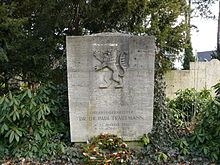Paul Trautmann (politician)

Paul Otto Theodor Trautmann (born February 24, 1881 in Staßfurt , † August 13, 1929 in Braunschweig ) was a German lawyer and politician. From 1917 to 1925 he was Lord Mayor of Frankfurt (Oder) and from 1925 to 1929 Lord Mayor of Braunschweig.
life and work
The son of the Reichstag member Wilhelm Trautmann studied law in Halle , Göttingen and Kiel . In 1902 he became active with the Landsmannschaft Vitebergia Halle , in 1903 with the Landsmannschaft Gottinga Göttingen . He became a trainee lawyer in the Kiel city administration. After graduating as Dr. jur. et phil. Trautmann went to the Reich Office of the Interior as a court assessor in 1912 . In 1915 he became a councilor in the war economics department. From 1917 to 1925 he held the office of mayor of the city of Frankfurt (Oder) before he became mayor of Braunschweig on October 22, 1925 as Hugo Retemeyer's successor .
Frankfurt Lord Mayor
During his tenure, he was able to set up the Eastern Railway Directorate in the city. The "Kleist Society" was founded and the city participated in the establishment of a theater GmbH. Furthermore, the ostmark library was created and the construction of ostmark stadium planned. Trautmann was elected Lord Mayor of the City of Frankfurt / Oder in 1916 to succeed Georg Richter . He was u. a. Initiator of the Brandenburg Oderverein (1919). In 1925 he left the city service to move to Braunschweig.
Braunschweig Mayor
During his almost four-year term of office, Trautmann campaigned for the revocation of the Caspari Treaty , which was concluded in 1858 , but this did not take place until 1934 under Lord Mayor Hesse . Trautmann operated the expansion of the urban area and an intensive settlement and housing policy. Nibelungen Wohnbau GmbH, founded in 1926, continued the development of the core area of the Siegfriedviertel , which was laid out in 1919 . At Trautmann's instigation, the German Aviation School (DVS) was relocated to Braunschweig in 1928 . He was the stimulus for the two important exhibitions “ Faust on the Stage” and “ Lessing and His Time”. In 1928 the "House of Spiritual Work" (public library and reading hall) and the Gauß Museum were inaugurated.
Trautmann died in Braunschweig in 1929 at the age of 48.
Fonts (selection)
- The interpretation of last wills. (= Dissertation, University of Halle-Wittenberg, 1906.) R. Noske printing house, Borna-Leipzig 1906, OCLC 458362450 .
- Kiel's council constitution and council economy from the beginning of the 17th century to the beginning of self-government. A contribution to German urban history. (= Dissertation, University of Halle-Wittenberg, 1909.) in: Communications from the Society for Kiel City History. Issue 25/26. Lipsius & Tischer, Kiel 1909, OCLC 313560656 also published in: Peter von Oestmann, Joachim Rückert, Hans-Peter Haferkamp (eds.): Journal of the Savigny Foundation for Legal History: German Department. Volume 31, Issue 1, pp. 469-475. ISSN 0323-4045 , doi : 10.7767 / zrgga.1910.31.1.469
- with Fritz von Keller : Commentary on the Reich and Citizenship Act of July 22, 1913. CH Beck, Munich 1914, OCLC 717415129 .
literature
- Norman-Mathias Pingel: Trautmann, Paul in: Manfred Garzmann , Wolf-Dieter Schuegraf (Hrsg.): Braunschweiger Stadtlexikon . Supplementary volume. Joh. Heinr. Meyer Verlag, Braunschweig 1996, ISBN 3-926701-30-7 , p. 131 .
- Johannes Angel: Trautmann, Paul, Dr. in: Horst-Rüdiger Jarck , Günter Scheel (ed.): Braunschweigisches Biographisches Lexikon - 19th and 20th centuries . Hahnsche Buchhandlung, Hannover 1996, ISBN 3-7752-5838-8 , p. 613 .
- Henning Steinführer , Claudia Böhler (Ed.): The Braunschweiger Mayors. From the establishment of the office in the late Middle Ages to the 20th century. oeding print GmbH, Braunschweig 2013, ISBN 978-3-941737-68-6 .
Web links
- Literature by and about Paul Trautmann at the Library Service Center Baden-Württemberg (BSZ)
- City archive Frankfurt (Oder): Paul Otto Theodor Trautmann (1917–1925) on stadtarchiv-ffo.de
Individual evidence
- ↑ Stadtarchiv Frankfurt (Oder) 100 years of electricity and trams…. (P. 15/16) on stadtarchiv-ffo.de
- ↑ Heinrich-Zille-Straße ( Memento of the original from May 29, 2014 in the Internet Archive ) Info: The archive link was automatically inserted and not yet checked. Please check the original and archive link according to the instructions and then remove this notice. on museum-viadrina.de (short biography)
- ↑ Horst-Rüdiger Jarck , Günter Scheel (ed.): Braunschweigisches Biographisches Lexikon - 19th and 20th centuries . Hahnsche Buchhandlung, Hannover 1996, ISBN 3-7752-5838-8 , p. 613 .
| personal data | |
|---|---|
| SURNAME | Trautmann, Paul |
| ALTERNATIVE NAMES | Trautmann, Paul Otto Theodor (full name) |
| BRIEF DESCRIPTION | German lawyer and politician |
| DATE OF BIRTH | February 24, 1881 |
| PLACE OF BIRTH | Staßfurt |
| DATE OF DEATH | August 13, 1929 |
| Place of death | Braunschweig |

